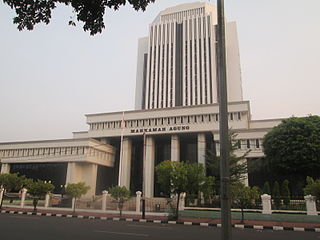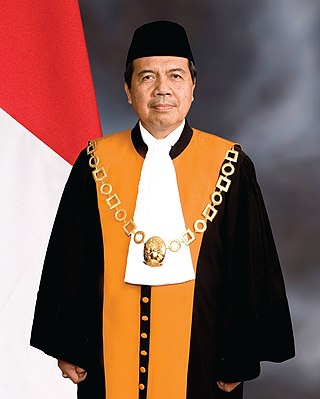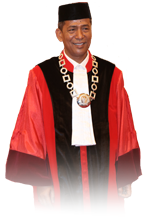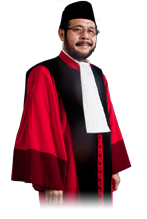The chief justice is the presiding member of a supreme court in many countries with a justice system based on English common law, such as the High Court of Australia, the Supreme Court of Canada, the Supreme Court of Ghana, the Court of Final Appeal of Hong Kong, the Supreme Court of India, the Supreme Court of Ireland, the Supreme Court of Japan, the Supreme Court of Nepal, the Supreme Court of New Zealand, the Supreme Court of Nigeria, the Supreme Court of Pakistan, the Supreme Court of the Philippines, the Supreme Court of Singapore, the Supreme Court of the United States, and provincial or state supreme courts/high courts.

The Constitutional Court of South Africa is a supreme constitutional court established by the Constitution of South Africa, and is the apex court in the South African judicial system, with general jurisdiction.

In most legal jurisdictions, a supreme court, also known as a court of last resort, apex court, and highcourt of appeal, is the highest court within the hierarchy of courts. Broadly speaking, the decisions of a supreme court are binding on all other courts in a nation and are not subject to further review by any other court. Supreme courts typically function primarily as appellate courts, hearing appeals from decisions of lower trial courts, or from intermediate-level appellate courts. A Supreme Court can also, in certain circumstances, act as a court of original jurisdiction, however, this is typically limited to constitutional law.

The Supreme Court of the Republic of Indonesia is the independent judicial arm of the state. It maintains a system of courts and sits above the other courts and is the final court of appeal. It can also re-examine cases if new evidence emerges.

The Judiciary of Indonesia constitutionally consists of the Supreme Court of Indonesia, the Constitutional Court of Indonesia, and the lesser court system under the Supreme Court. These lesser courts are categorically subdivided into the public courts, religious courts, state administrative courts, and military courts.

The Constitutional Court of the Republic of Indonesia is one of the apex courts in Indonesia along with the Indonesian Supreme Court. Its primary role is reviewing the constitutionality of Acts (undang-undang). It also has other functions, including resolving disputes over the powers of state institutions, settling disputes over the results of general elections, deciding on the dissolution of political parties, and supervising impeachment. The last two functions have never been exercised by the Court.

The Judicial Commission of Indonesia was established as a consequence of the third amendment to the Constitution of Indonesia ratified by the Indonesian People's Consultative Assembly on 9 November 2001. The Commission's duty is to monitor the performance of judges, advise the House of Representatives on judicial appointments and review community complaints about the behavior and fairness of presiding judges.

Justices of the Supreme Court of the United Kingdom are the judges of the Supreme Court of the United Kingdom other than the president and the deputy president of the court. The Supreme Court is the highest court of the United Kingdom for all civil cases, and for criminal cases from the jurisdictions of England and Wales and Northern Ireland. Judges are appointed by the British monarch on the advice of the prime minister, who receives recommendations from a selection commission.

The Supreme Court, located in Khartoum, is the highest judicial authority in Sudan, apart from the Constitutional Court, which under Article 30 of the August 2019 Draft Constitutional Declaration, is to be "an independent court, separate from the judicial authority." Nemat Abdullah Khair was appointed as Chief Justice of Sudan, thus becoming the President of the Supreme Court, on 10 October 2019.

The chief justice of Kenya is a public office in the Republic of Kenya established under Article 161 of the country's Constitution as the head of the Judiciary of Kenya. Under Article 163, the chief justice also serves as the president of the Supreme Court of Kenya. The chief justice is assisted by the deputy chief justice, who also serves as the deputy president of the Supreme Court.

The chief justice of the Supreme Court of Indonesia is the head of the Supreme Court of Indonesia.

The chief justice of the Constitutional Court of Indonesia is the head of the Constitutional Court of Indonesia.
Chief Justice of Indonesia may refer to:

The Deputy Chief Justice of the Constitutional Court of Indonesia is the second highest-ranking official serving on the Constitutional Court of Indonesia. Like the Chief Justice of the Constitutional Court of Indonesia, the Deputy Chief Justice is elected by the nine serving justices on the court from among their number.

Anwar Usman is an Indonesian judge and jurist who was the sixth Chief Justice of the Constitutional Court of Indonesia. He was elected to the position on 2 April 2018, replacing Arief Hidayat. He previously served as the fifth Deputy Chief Justice of the Constitutional Court of Indonesia. Usman served on the Constitutional Court for four years prior to his confirmation as Deputy Chief Justice. Before replacing Arsyad Sanusi as a sitting justice on the court in April 2011, Usman was a high court judge in Jakarta as well as the manager of human resources at the Supreme Court of Indonesia.

Muhammad Syarifuddin is an Indonesian jurist who serves as the 14th and current Chief Justice of the Supreme Court of Indonesia since 30 April 2020. He also serves as the Deputy Chief Justice of the Supreme Court Indonesia for judicial affairs, and previously served as the Supreme Court's head of supervision.
Ahmad Fadlil Sumadi is a former judge on the Constitutional Court of Indonesia. Sumadi initially served as the registrar of the Constitutional Court between 2003 and 2008, then served as the deputy chief justice of the High Court of Yogyakarta before the Supreme Court of Indonesia appointed him to the Constitutional Court in 2010.

Mandisa Muriel Lindelwa Maya is the Deputy Chief Justice of South Africa. She was formerly the President of the Supreme Court of Appeal from 2017 to 2022. She joined the bench in May 2000 as a judge of the Transkei Division of the High Court of South Africa and was elevated to the Supreme Court of Appeal in 2006.
The Republic of Korea has no officially recognized South Korean order of precedence, yet the Office of the President(EOP) once officially declared order of precedence among the chiefs of 6 highest constitutional institutions in year 2006 as following:
- the President of the Republic of Korea, as both head of state and leader of government
- the Speaker of the National Assembly, as leader of legislature
- the Chief Justice of the Supreme Court and the President of the Constitutional Court, as co-leader of the judiciary
- the Prime Minister, as deputy leader of government
- the Chair of the National Election Committee, as leader of constitutionally independent agency for national election administration














